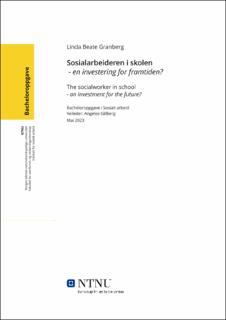| dc.contributor.advisor | Gillberg, Angelee | |
| dc.contributor.author | Granberg, Linda Beate | |
| dc.date.accessioned | 2023-06-27T17:20:24Z | |
| dc.date.available | 2023-06-27T17:20:24Z | |
| dc.date.issued | 2023 | |
| dc.identifier | no.ntnu:inspera:146720930:70302338 | |
| dc.identifier.uri | https://hdl.handle.net/11250/3073758 | |
| dc.description.abstract | Denne oppgaven tar sikte på å gi et innblikk i hvordan en sosialarbeider i skolen kan jobbe forebyggende på ungt utenforskap. Ungt utenforskap omhandler unge voksne som står utenfor arbeid eller opplæring, og er en gruppe som har fått økende oppmerksomhet de siste årene. En av de vanligste årsakene til at unge faller utenfor i dag er lav utdanning, som ofte har sammenheng med vanskelige oppvekstsvilkår, mistrivsel og mobbing i skolen, som igjen har ført til avbrutt utdanningsløp. Dette kan medføre store konsekvenser for den det gjelder når det kommer til muligheter på arbeidsmarkedet, økonomi og sosiale og helsemessige forhold. I tillegg kan ungt utenforskap innebære store økonomiske tap for det norske samfunn.
Å få flere til å fullføre videregående skole er en viktig politisk strategi i arbeidet mot å forebygge ungt utenforskap. Denne oppgaven tar imidlertid for seg hvordan en sosialarbeider i ungdomsskolen kan arbeide forebyggende på ungt utenforskap, for at ungdommene skal ha et godt liv og trives i skolen på et tidlig tidspunkt, og dermed kunne motiveres til å fortsette sin skolegang inn i videregående skole. For sosialfaglige yrkesgrupper er skolen en relativt ny arbeidsplass med noe uklare roller, og om dette er en yrkesgruppe som bør lovfestes i skolen er det uenighet om. Samtidig foreligger det et dokumentert behov for å supplere lærerrollen med personale som har kompetanse til å ta seg av elever med emosjonelle og sosiale vansker. Oppgavens formål er å belyse sosialarbeiderens brede kunnskaps- og kompetansefelt, og på hvilken måte dette kan bidra til å utfylle lærerrollen, samt forebygge at ungdom faller fra og havner utenfor på et senere tidspunkt. | |
| dc.description.abstract | This bachelor thesis seeks to enlighten how a social worker in secondary school can work preventively on youth exclusion. Youth exclusion refer to young people who are not in education, employment or training, and the attention to these young individuals has increased over the last years. One of the most common reasons young people get excluded today can be tied to low education, which in turn can be related to difficult childhood, dissatisfaction and bullying at school. This often leads to interrupted education. This situation may lead to great impacts on the persons probability to be employed, personal economy and social- and health conditions. In addition, youth exclusion can also be tied to major economic impacts on the Norwegian economy and society.
Having more people complete upper secondary school is an important political strategy in the work to prevent youth exclusion. However, this thesis seeks to enlighten how a social worker in secondary school can work preventively on youth exclusion, so that young people can experience thrive and affiliation in school at an early stage. Hopefully this will help motivate those who struggles to continue their schooling into upper secondary school. For social workers, the school is a relatively new workplace with somewhat unclear roles, and there is disagreement about whether this is a profession that should be legislated in schools. At the same time, there is a documented need to supplement the teachers with staff who have the competence to take care of pupils with emotional and social difficulties. The purpose of the assignment is to shed light on the social worker's broad field of knowledge and competence, and in what way this can contribute to complementing the role of the teacher, as well as preventing youth exclusion. | |
| dc.language | nob | |
| dc.publisher | NTNU | |
| dc.title | Sosialarbeideren i skolen - en investering for framtiden? | |
| dc.type | Bachelor thesis | |
